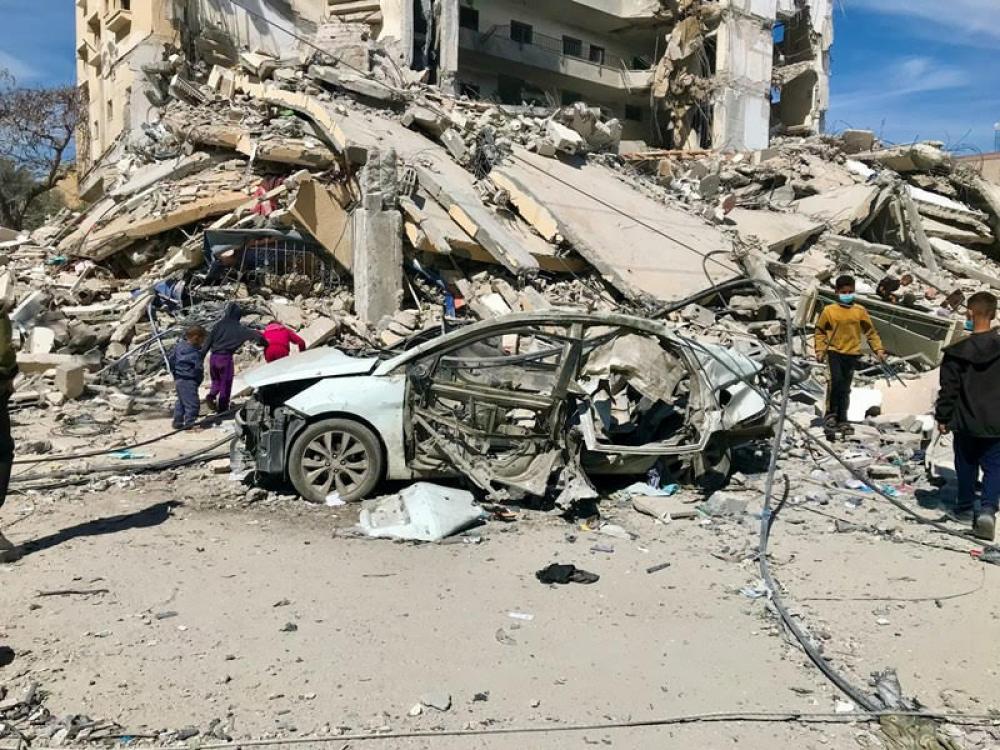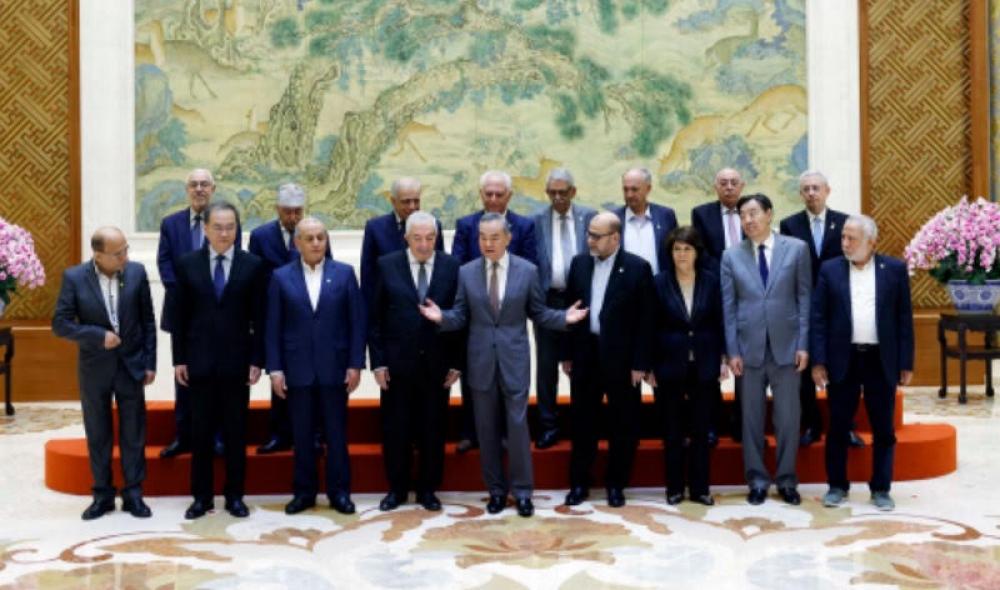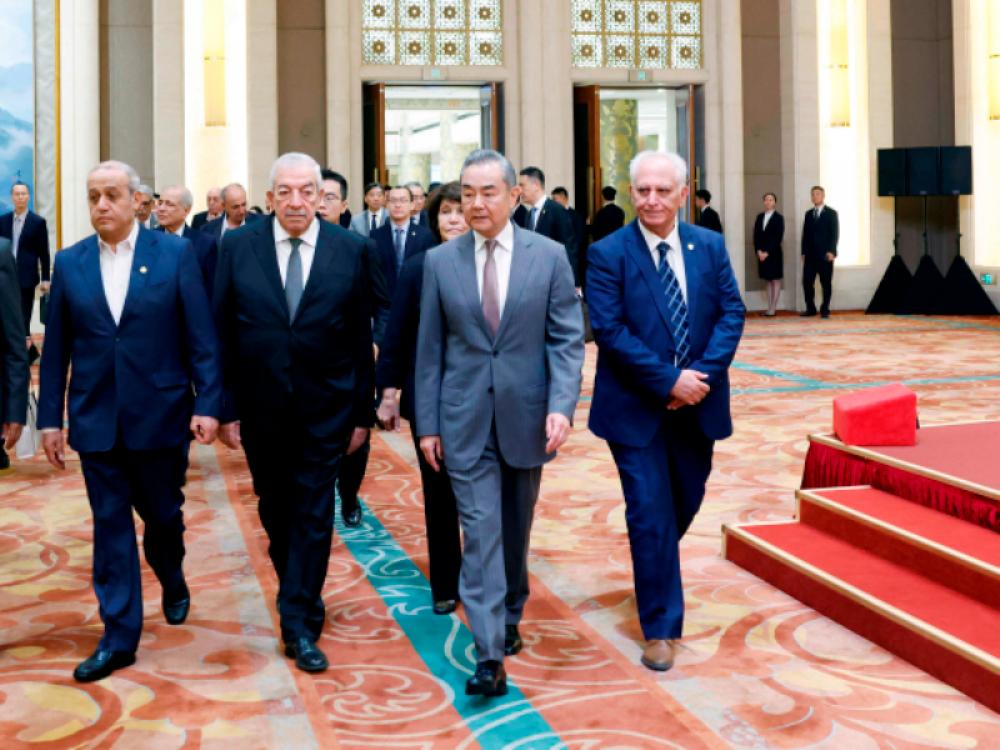Just Earth News | @justearthnews | 07 Aug 2024, 06:39 am Print
 Middle East Conflict
Middle East Conflict Scenes of the destruction in Gaza city amid ongoing Israel-Hamas war. Photo by Emad El Byed on Unsplash.
Beijing: Amid the ongoing Israel-Palestine conflict, as many as 14 Palestinian factions, including Fatah, Palestinian Islamic Jihad and the terrorist organization Hamas, have agreed to form a government after talks were hosted by Beijing, and analysts believe the Chinese Communist regime is forging closer ties with terrorist groups in the Middle East to expand influence in the region as well as sharpen its anti-US alliance.
Earlier on July 23, following two days of reconciliation, 14 Palestinian factions co-signed a declaration in the Chinese capital of Beijing on “ending division and strengthening Palestinian unity” and establishing a “provisional national reconciliation government” in the reconstruction of post-war Gaza, reports said.
While Ismail Haniyeh, a top leader of Hamas, was assassinated last week by an explosive device covertly smuggled into the Tehran guesthouse in Iran where he was staying, Hamas has named Gaza leader Yahya Sinwar as its new chief.
Israel has publicly accused Yahya Sinwar of being the “mastermind” behind Hamas’ terror attack against Israel on October 7 last year – though experts say he is likely one of several – making him one of the key targets of its war in Gaza, as reported by CNN.
According to The Diplomat, this initiative by Beijing marked another step in China’s involvement in West Asian politics, particularly the Israel- Palestine conflict as the meeting culminated in a notable achievement, with Chinese Foreign Minister Wang Yi announcing an agreement among the Palestinian factions to establish an interim national reconciliation government for post-war Gaza.
The Chinese foreign minister's statements, however, neither provided clarity about the involvement of Hamas, which is not a part of the Palestine Liberation Organization (PLO) in this arrangement, nor specified the immediate consequences of any agreement, reports The Diplomat.
 Palestinian factions sign 'Beijing Declaration' on ending division and strengthening Palestinian national unity. Photo credit: Chinese Ministry of Foreign Affairs
Palestinian factions sign 'Beijing Declaration' on ending division and strengthening Palestinian national unity. Photo credit: Chinese Ministry of Foreign Affairs
The discussions, which were attended by top Chinese diplomats, took place amid uncertainty over the future administration of Palestinian lands, as Israeli Prime Minister Benjamin Netanyahu has repeatedly pledged to eliminate Hamas in retaliation for the group’s terrorist attack on its territory on October 7 last year, and Beijing, notably, has not condemned Hamas’ actions.
The recent “Beijing Declaration” is a part of ongoing efforts to unite the Palestinian leadership factions; though, unity declarations failed in negotiations earlier, as per reports.
According to The Diplomat, rather than a game-changer for the Palestine conflict, the Beijing Declaration should be viewed as evidence of the Chinese Communist regime’s increasing eagerness to position itself as a prominent mediator in West Asian affairs, while this diplomatic push aligns with Beijing’s broader strategy of expanding its global influence, particularly in regions with significant economic interests.
According to The Epoch Times, this new round of mediation was initiated by the Chinese Communist Party (CCP) to seek compromises among the Palestinian factions, especially between the rival forces of Hamas and Fatah in the long-standing conflicts in Gaza and the West Bank of the Jordan River.
The CCP hosted the first round of talks between the rivals in April, but it did not yield substantive results, and subsequently, the second round of talks, scheduled for June, was postponed, as per reports.
Wu Zuolai, a United States-based China affairs columnist and political commentator, told The Epoch Times that he believes Beijing is now helping to unite terrorist organizations in a move with significant implications.
“Just as it recognizes the Taliban in Afghanistan as the legitimate government, it is expanding its rear [guard] in the Middle East in the same way,” Zuolai told The Epoch Times. “The CCP is pushing forward a united front with the terrorist forces in the Middle East, in a long-term and sinister plan to confront the US and the Western world."
Since Hamas seized the Gaza Strip in 2007 and expelled Palestinian nationalist and social democratic political party Fatah, Palestinians have been locked in a prolonged war.
On the same day of the announced agreement, Israeli Foreign Minister Yisrael Katz posted on X (formerly Twitter) that “Hamas and Fatah signed an agreement in China for joint control of Gaza after the war. Instead of rejecting terrorism, [Fatah leader] Mahmoud Abbas embraces the murderers and rapists of Hamas, revealing his true face.”
“In reality, this won’t happen because Hamas’s rule will be crushed, and Abbas will be watching Gaza from afar. Israel’s security will remain solely in Israel’s hands,” Katz's X post read.
According to The Diplomat, this initiative is not Beijing’s first foray into West Asian politics, particularly concerning the long-standing dispute between Israel and Palestine.
 Palestinian factions sign 'Beijing Declaration' in presence of Chinese Foreign Affairs Minister Wang Yi. Photo credit: Chinese Foreign Affairs Ministry
Palestinian factions sign 'Beijing Declaration' in presence of Chinese Foreign Affairs Minister Wang Yi. Photo credit: Chinese Foreign Affairs Ministry
China, with an aim to arbitrate between Israel and Palestine and find closure to their conflict, hosted Palestine Liberation Organization (PLO) president Mahmoud Abbas for a state visit in June last year, and before that, Beijing’s effective mediation between Iran and Saudi Arabia in March 2023 highlighted its rising capacity to convert economic might into diplomatic influence in West Asia, reports The Diplomat.
Beijing’s efforts toward Palestinian reconciliation can be understood as a multifaceted strategy to enhance its global standing, expand its geopolitical influence, and safeguard its economic interests in West Asia, reports The Diplomat, adding that this strategy exemplifies the Chinese regime’s overarching aspiration to position itself as a conscientious global force.
However, responding to the Chinese-brokered agreement, Matthew Miller, the spokesperson of the US State Department, said in a July 24 press briefing that the department had not yet reviewed the text of the Beijing agreement, reiterating that Hamas is a US-designated terrorist organization, and Washington believes the group should not be involved in the post-war governance of Gaza.
Shi Shan, a senior contributor to the Chinese edition of The Epoch Times, told the US-based media outlet that the Chinese Communist regime is not concerned about regional peace, and on the contrary, it is pulling strings among various forces in the Middle East.
"The CCP is trying to exert influence over terrorist organizations by providing financial assistance or other means and using them to play a role in the CCP’s time of need," Shi added.
According to the United States Institute of Peace (USIP), China will see the outcome of the “Beijing Declaration” as a diplomatic win and a boon for its campaign to project influence in the Middle East and to address issues that it perceives as intractable or ignored under the US-led order, but the reality is that the stakes were very low for Beijing given the current situation in the Middle East.
- Pakistan: Armed gunmen kidnap 14 workers during coordinated raids in Balochistan
- ISIS-inspired plot foiled in UK: Two men get life sentences for targeting Jewish community
- India rejects allegations, urges Pakistan to tackle its ‘home-grown ills’
- Massacre in Islamabad: ISIS takes responsibility for deadly Pakistan blast
- Friday turns fatal: 31 dead, 169 injured in shocking Pakistan mosque blast





-1763561110.jpg)
